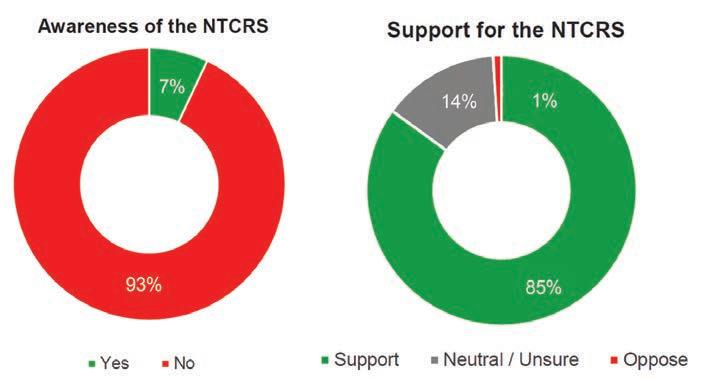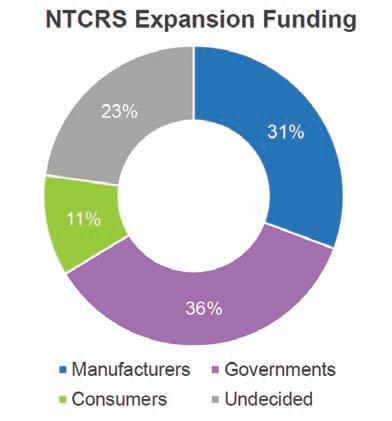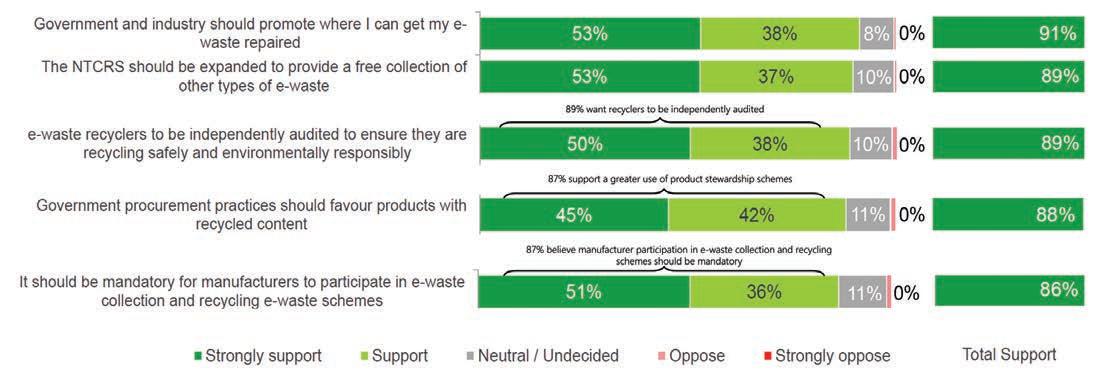
4 minute read
A NATIONAL APPROACH
MARKET RESEARCH FOR PRODUCT STEWARD AUSTRALIA NEW ZEALAND RECYCLING PLATFORM HAS PROVIDED AN INSIGHT INTO THE HEARTS AND MINDS OF AUSTRALIANS REGARDING E-WASTE.
Australia needs to take the next step in e-waste recycling, says Warren Overton, Chief Executive Officer Australia New Zealand Recycling Platform (ANZRP).
ANZRP has been advocating for an expansion of the National Television and Computer Recycling Scheme (NTCRS) to include waste electronic and electrical equipment (WEEE) for several years. Warren says they’re not alone.
Recent research commissioned by ANZRP shows 76 per cent of Australians believe e-waste going to landfill is an important issue, yet 14 per cent of unused computers and nine per cent of computer monitors and televisions are ending up in general waste.
Warren says this can be attributed to confusion about what collection programs are free and what products can be collected. He believes a single system approach will deliver better e-waste recycling outcomes.
“There’s a lot of will and people want to do the right thing, but different brands are doing different things which creates confusion,” Warren says.
“There needs to be national consistency around this and a mandate that electronic waste should be recycled, and it should go through these channels.”
Warren says the Product Stewardship Act, which ANZRP is approved under, was recently reviewed by the Department of Agriculture, Water, and the Environment. The Australian Government has agreed to action all 26 recommendations from the review, including to assess the feasibility of expanding the NTCRS to include WEEE products.
He says there is “very sound logic” to support the expansion.
“There’s a lot of environmental benefits. Not only are you avoiding materials going to landfill, but you also avoid the energy of mining new resources and potentially toxic materials going into landfill.
“Economically, there’s hundreds of millions of dollars of material being put into landfill that could be reused. There’s also job creation.
“Australia is a big place. We collect 20,000 tonne a year of material. That’s a lot of material to move but it’s not economical to move around states and not enough is being collected to invest in facilities to drive better outcomes. If the NTCRS is expanded, it will increase material collection and the recycling industry has incentive to invest in infrastructure.”
Warren says the research shows that seven per cent of the public are aware of the NTCRS, however once explained, support for the service it provides is 85 per cent.
He says consumer reasons for supporting the scheme focus on reducing waste, creating jobs and
Warren Overton, CEO, Australia New Zealand Recycling Platform (ANZRP).


Repairing e-waste
security. 95 per cent cite the importance of having efficient and convenient collection points, 93 per cent cite the collection of e-waste being vital to mitigating waste to landfill and 87 per cent cite the importance of having an industry-funded scheme making it free for households to recycle.
The research shows the vast majority of people support NTCRS expansion to include all electrical items, with 89 per cent suggesting it be expanded to provide a free collection service for all types of e-waste.
In other findings, 89 per cent of respondents want recyclers to be independently audited, 86 per cent believe it should be mandatory for manufacturers to participate in e-waste collection and recycling schemes, and 85 per cent support a greater use of product stewardship schemes.
Warren says ANZRP believes a mandatory scheme provides the best outcome.
“A mandatory, co-regulatory scheme has targets and enforced compliance requirements. Voluntary schemes work well, but in our experience, they don’t deliver the same collection levels, outcomes and compliance results.
“If you don’t make it mandatory you . can also have the ‘free riders’ that don’t do the right thing and bring the rest of the market down. For us, it’s really important that a scheme has to be mandatory and 86 per cent of people also believe it should be.”
Warren says one of the interesting findings from the research was about who should pay for stewardship schemes. He says Australians believe that governments and/ or manufacturers should fund the scheme. Specifically, 36 per cent felt it was the responsibility of government to fund such a scheme, 31 per cent felt it was up to the manufacturers, and 11 per cent consumers. 23 per cent were undecided.
“Our program is 100 per cent funded by industry,” he says.
“The industry is probably spending $30 million a year to fund this program, but we want the Federal Government to be responsible for a national communications effort and put more resources into compliance and consistent marketing.
“Compliance is important. If we have standards and requirements around collection systems and who participates it delivers a really great outcome.
“We have an impressive array of global organisations that support ANZRP because we provide them with their regulatory obligations. We drive our recyclers hard, and we have high standards. We audit them and ensure compliance.”
Warren says the research, by resolvestrategic, will play an important role in driving home the benefits of expanding the NTCRS.
“I don’t think the general public has picked up on this yet.
Compared with other environmental issues they don’t see it as important as plastic in the ocean, but when we explain to people what we do, they believe it should be expanded.
“It’s logical, but there’s not a lot of awareness yet.”
For more information, visit: www.anzrp.com.au











